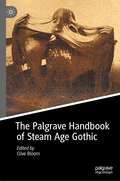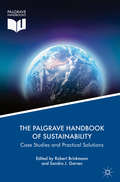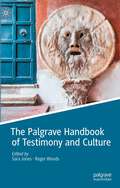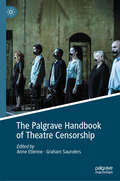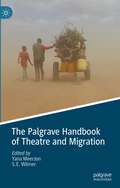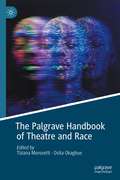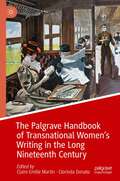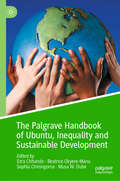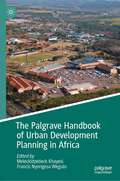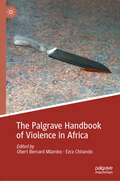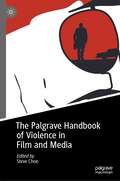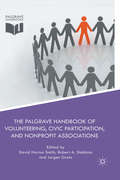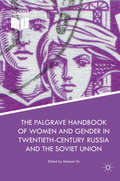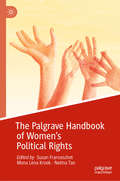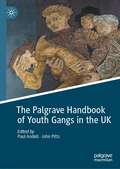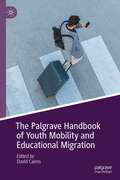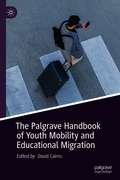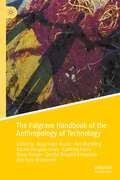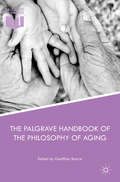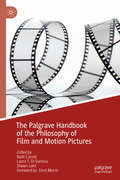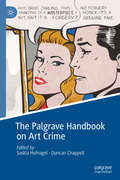- Table View
- List View
The Palgrave Handbook of Steam Age Gothic
by Clive BloomBy the early 1830s the old school of Gothic literature was exhausted. Late Romanticism, emphasising as it did the uncertainties of personality and imagination, gave it a new lease of life. Gothic—the literature of disturbance and uncertainty—now produced works that reflected domestic fears, sexual crimes, drug filled hallucinations, the terrible secrets of middle class marriage, imperial horror at alien invasion, occult demonism and the insanity of psychopaths. It was from the 1830s onwards that the old gothic castle gave way to the country house drawing room, the dungeon was displaced by the sewers of the city and the villains of early novels became the familiar figures of Dr Jekyll and Mr Hyde, Dracula, Dorian Grey and Jack the Ripper. After the death of Prince Albert (1861), the Gothic became darker, more morbid, obsessed with demonic lovers, blood sucking ghouls, blood stained murderers and deranged doctors. Whilst the gothic architecture of the Houses of Parliament and the new Puginesque churches upheld a Victorian ideal of sobriety, Christianity and imperial destiny, Gothic literature filed these new spaces with a dread that spread like a plague to America, France, Germany and even Russia. From 1830 to 1914, the period covered by this volume, we saw the emergence of the greats of Gothic literature and the supernatural from Edgar Allan Poe to Emily Bronte, from Sheridan Le Fanu to Bram Stoker and Robert Louis Stevenson. Contributors also examine the fin-de-siècle dreamers of decadence such as Arthur Machen, M P Shiel and Vernon Lee and their obsession with the occult, folklore, spiritualism, revenants, ghostly apparitions and cosmic annihilation. This volume explores the period through the prism of architectural history, urban studies, feminism, 'hauntology' and much more. 'Horror', as Poe teaches us, 'is the soul of the plot'.
The Palgrave Handbook of Sustainability: Case Studies And Practical Solutions
by Robert Brinkmann Sandra J. GarrenThis book provides a comprehensive overview of the practice of sustainability through a diverse range of case studies spanning across varied fields and areas of expertise. It provides a clear indication as to the contemporary state of sustainability in a time faced by issues such as global climate change, challenges of environmental justice, economic globalization and environmental contamination. The Palgrave Handbook of Sustainability explores three broad themes: Environmental Sustainability, Social Sustainability and Economic Sustainability. The authors critically explore these themes and provide insight into their linkages with one another to demonstrate the substantial efforts currently underway to address the sustainability of our planet. This handbook is an important contribution to the best practises on sustainability, drawn from many different examples across the fields of engineering, geology, anthropology, sociology, biology, chemistry and religion.
The Palgrave Handbook of Testimony and Culture
by Roger Woods Sara JonesThis Palgrave Handbook examines the ways in which researchers and practitioners theorise, analyse, produce and make use of testimony. It explores the full range of testimony in the public sphere, including perpetrator testimony, testimony presented through social media and virtual reality. A growing body of research shows how complex and multi-layered testimony can be, how much this complexity adds to our understanding of our past, and how creators and users of testimony have their own complex purposes. These advances indicate that many of our existing assumptions about testimony and models for working with it need to be revisited. The purpose of this Palgrave Handbook is to do just that by bringing together a wide range of disciplinary, theoretical, methodological, and practice-based perspectives.
The Palgrave Handbook of Theatre Censorship
by Graham Saunders Anne EtienneThis book incorporates a wide theoretical, cultural, literary and historical engagement in exploring the tension between dramatic productions and the forms of censorship they encounter from creation to reception. The Palgrave Handbook of Theatre Censorship offers global new insights into censorship practices, examining attempts at repression motivated either by fears that audiences gathering together to watch live dramatic events will lead to sedition and mass uprisings, or by moral or religious squeamishness requiring the establishment of institutional systems of censorship to curb or suppress the stage. As such, the Handbook aims to initiate redefinitions of what we understand or experience as censorship. Who knew theatre could (still) carry so many threats, or be so widely provocative and dangerous? This is an extraordinary and often eye-opening set of thirty-six individually insightful, wide-ranging and oftentimes disturbing essays, each of which offers unique insights into theatre censorship practices and their impact within a specific political and moral culture. There is a particular emphasis on the recent and current, and the authors speak with first-hand knowledge and from direct experience not only about the restrictions but also how artists sometimes negotiate and evade these. What makes the book so especially fascinating and illuminating is seeing so many examples juxtaposed together. This enables the reader to hear the essays and the cultures talking to and alongside each other. The collection repeatedly breaks fresh ground, and the editors deserve enormous credit for gathering and effectively curating so many reports from the front-line. Steve Nicholson, Emeritus Professor, University of Sheffield, UK Anne Etienne and Graham Saunders’s book is a wide-ranging, incisive and compelling collection of reflections and case studies on the theatre industry’s relationship to censorship and self-censorship from a historical and contemporaneous perspective. An impressive array of authors have been assembled for this volume representing, among them, views on the subject from Spain, Denmark, Norway, Zimbabwe, South Africa, Germany, Italy, Indonesia, Iran, Portugal, Turkey, Brazil, Japan, Ireland, Australia, Russia, England and more. The book is by turns surprising in its curatorial and narrative design and wonderfully effective at delineating the complex and thorny paths that create socio-political cultures where the censorship and self-censorship of theatre artists thrives and/or is efficaciously contested and rebelled against. Of note is a through line of argument in the book around less overt modes of surveillance that police artists’ imaginations and thereby the work they create and produce. At a time in the world where many governments are increasingly seeking to limit artistic expression, this book is a necessary reminder of the many freedoms that have been fought for in theatres around the globe, and how the power of being unsilenced must never be taken for granted. – Caridad Svich. Playwright & Translator This is a truly excellent collection of incisive studies. It is wide-ranging, impressively global in scope, with an illuminating balance of the historical and the contemporary. In its impressive and well-realised ambition, demonstrated by the well-focused intelligence and academic flair of its many contributors, this collection is both magisterial and vital. It is an essential contribution to censorship studies, fascinating and inspiring, a must-read for anyone interested in the subject. – Aleks Sierz. Theatre critic and author of Rewriting the Nation: British Theatre Today (2011) & Good Nights Out: A History of British Theatre Since the Second World War (2021)
The Palgrave Handbook of Theatre and Migration
by Yana Meerzon S. E. WilmerThe Palgrave Handbook of Theatre and Migration provides a wide survey of theatre and performance practices related to the experience of global movements, both in historical and contemporary contexts. Given the largest number of people ever (over one hundred million) suffering from forced displacement today, much of the book centres around the topic of refuge and exile and the role of theatre in addressing these issues. The book is structured in six sections, the first of which is dedicated to the major theoretical concepts related to the field of theatre and migration including exile, refuge, displacement, asylum seeking, colonialism, human rights, globalization, and nomadism. The subsequent sections are devoted to several dozen case studies across various geographies and time periods that highlight, describe and analyse different theatre practices related to migration. The volume serves as a prestigious reference work to help theatre practitioners, students, scholars, and educators navigate the complex field of theatre and migration.
The Palgrave Handbook of Theatre and Race
by Tiziana Morosetti Osita OkagbueThe first comprehensive publication on the subject, this book investigates interactions between racial thinking and the stage in the modern and contemporary world, with 25 essays on case studies that will shed light on areas previously neglected by criticism while providing fresh perspectives on already-investigated contexts. Examining performances from Europe, the Americas, the Middle East, Africa, China, Australia, New Zealand, and the South Pacifi c islands, this collection ultimately frames the history of racial narratives on stage in a global context, resetting understandings of race in public discourse.
The Palgrave Handbook of Transnational Women’s Writing in the Long Nineteenth Century
by Clorinda Donato Claire Emilie MartinThis handbook explores the rich and as yet understudied field of women’s writing during the nation-building years that characterized the global politics of the long nineteenth century. In the wake of the American and French Revolutions, the waning of the Spanish Empire, subsequent Latin American uprisings, and the Italian Risorgimento, nineteenth-century women writers cracked wide open the myths of gender, race, and class that had sustained the ancien régime. This volume shows that the transnational networks of women writing about politics, sexuality, economics, and the forging of the modern nation were much broader and more inclusive at a global level than has previously been understood. The handbook uniquely foregrounds French, Italian, Latin American, and Spanish women writers, focusing on the transnational nature of their relationships and cultural production within a growing body of research that casts an ever-wider net in the effort to document women’s voices.
The Palgrave Handbook of Ubuntu, Inequality and Sustainable Development
by Musa W. Dube Ezra Chitando Sophia Chirongoma Beatrice Okyere-ManuThe Palgrave Handbook of Ubuntu, Inequality and Sustainable Development interrogates the multiple inequalities that subsist in the world and explores how Ubuntu, emerging from Africa but being potentially applicable elsewhere, holds promise for mitigation and resolution. It highlights inequalities that relate to gender, climate change, the environment, race, migration, and the struggle against poverty. It reflects on how and the extent to which Ubuntu can be a strategic resource in pursuit of equality and justice.
The Palgrave Handbook of Urban Development Planning in Africa
by Meleckidzedeck Khayesi Francis Nyongesa WeguloWhere can one get a synthesis of research findings on urban development planning in Africa? This book addresses this gap in knowledge by distilling existing research to provide insights into theories, research designs, empirical findings and approaches on urban development planning in Africa. Starting with the overall planning culture and strategies, the book chapters move on to specific themes such as governance, population, poverty, water, recreation, transport, agriculture, air quality and rural-urban linkages. This book reduces the prevailing risk of unnecessary duplication of research and the inadequate attention that is being given to extending research in new areas. This situation has partly been due to existing research remaining scattered in different organizations and publications and has not been subjected to critical synthesis to unearth any new developments that it contains. The book makes available research findings to be utilized in current and future urban development planning in Africa.
The Palgrave Handbook of Utopian and Dystopian Literatures
by Jennifer A. Wagner-Lawlor Peter Marks Fátima VieiraThe Palgrave Handbook of Utopian and Dystopian Literatures celebrates a literary genre already over 500 years old. Specially commissioned essays from established and emerging international scholars reflect the vibrancy of utopian vision, and its resiliency as idea, genre, and critical mode. Covering politics, environment, geography, body and mind, and social organization, the volume surveys current research and maps new areas of study. The chapters include investigations of anarchism, biopolitics, and postcolonialism and study film, art, and literature. Each essay considers central questions and key primary works, evaluates the most recent research, and outlines contemporary debates. Literatures of Africa, Australia, China, Latin America, and the Middle East are discussed in this global, cross-disciplinary, and comprehensive volume.
The Palgrave Handbook of Violence in Africa
by Ezra Chitando Obert Bernard MlamboThis handbook brings together global research on violence in Africa from academics, practitioners and activists across a multitude of subjects. It seeks to create the widest possible space for debate, discussion, and analysis of the broad range of issues and problems of violence. It transcends disciplinary and geographic borders in order to create new ground in this space. The chapters in this handbook cover diverse themes such as: the topography of violence, technologies of violence, terrorism, civil war and insurgent violence, child soldiers and violence, epistemic violence, structural violence, violence and memory, violence and the law, cultural mechanisms for creating, sustaining, resisting, and mitigating violence, political violence, violence in moments of religious, social and geo-political transformation, gender and violence, violence against nature, and violence and social media. It centralises new meanings, understandings and fresh ideas to the concept ofviolence, broadening its scope, and contributing to the debates that will shape Africa’s common future. It shines a light on key elements of African culture and the cultural mechanisms for creating, sustaining, resisting, and mitigating violence in Africa. It strives to be relevant to the needs and concerns of African societies by suggesting practical solutions for overcoming violence. This book ties in with development initiatives in Africa, such as Agenda 2063, for the Africa We Want, and the 2030 United Nations Sustainable Development Goals (SDGs).
The Palgrave Handbook of Violence in Film and Media
by Steve ChoeThe chapters contained in this handbook address key issues concerning the aesthetics, ethics, and politics of violence in film and media. In addition to providing analyses of representations of violence, they also critically discuss the phenomenology of the spectator, images of atrocity in international cinema, affect and documentary, violent video games, digital infrastructures, cruelty in art cinema, and media and state violence, among many other relevant topics. The Palgrave Handbook of Violence in Film and Media updates existing studies dealing with media and violence while vastly expanding the scope of the field. Representations of violence in film and media are ubiquitous but remain relatively understudied. Too often they are relegated to questions of morality, taste, or aesthetics while judgments about violence can themselves be subjected to moral judgment. Some may question whether objectionable images are worthy of serious scholarly attention at all. While investigating key examples, the chapters in this handbook consider both popular and academic discourses to understand how representations of violence are interpreted and discussed. They propose new approaches and raise novel questions for how we might critically think about this urgent issue within contemporary culture.
The Palgrave Handbook of Volunteering, Civic Participation, and Nonprofit Associations
by Robert A. Stebbins David Horton Smith Jurgen GrotzWritten by over 200 leading experts from over seventy countries, this handbook provides a comprehensive, state-of-the-art overview of the latest theory and research on volunteering, civic participation and nonprofit membership associations. The first handbook on the subject to be truly multinational and interdisciplinary in its authorship, it represents a major milestone for the discipline. Each chapter follows a rigorous theoretical structure examining definitions, historical background, key analytical issues, usable knowledge, and future trends and required research. The nine parts of the handbook cover the historical and conceptual background of the discipline; special types of volunteering; the major activity areas of volunteering and associations; influences on volunteering and association participation; the internal structures of associations; the internal processes of associations; the external environments of associations; the scope and impacts of volunteering and associations; and conclusions and future prospects. This handbook provides an essential reference work for third-sector research and practice, including a valuable glossary of terms defining over eighty key concepts. Sponsored by the International Council of Voluntarism, Civil Society, and Social Economy Researcher Associations (ICSERA; www.icsera.org), it will appeal to scholars, policymakers and practitioners, and helps to define the emergent academic discipline of voluntaristics.
The Palgrave Handbook of Women and Gender in Twentieth-Century Russia and the Soviet Union
by Melanie IlicThis handbook brings together recent and emerging research in the broad areas of women and gender studies focusing on pre-revolutionary Russia, the Soviet Union and the post-Soviet Russian Federation. For the Soviet period in particular, individual chapters extend the geographic coverage of the book beyond Russia itself to examine women and gender relations in the Soviet 'East' (Tatarstan), Central Asia (Kazakhstan, Tajikistan and Uzbekistan) and the Baltic States (Estonia, Latvia and Lithuania). Within the boundaries of the Russian Federation, the scope moves beyond the typically studied urban centres of Moscow and St Petersburg to examine the regions (Krasnodar, Novosibirsk), rural societies and village life. Its chapters examine the construction of gender identities and shifts in gender roles during the twentieth century, as well as the changing status and roles of women vis-a-vis men in Soviet political institutions, the workplace and society more generally. This volume draws on a broad range of disciplinary and methodological approaches currently being employed in the academic field of Russian studies. The origins of the individual contributions can be identified in a range of conventional subject disciplines - history, literature, sociology, political science, cultural studies - but the chapters also adopt a cross- and inter-disciplinary approach to the topic of study. This handbook therefore builds on and extends the foundations of Russian women's and gender studies as it has emerged and developed in recent decades, and demonstrate the international, indeed global, reach of such research
The Palgrave Handbook of Women and Science since 1660
by Alison E. Martin Claire G. Jones Alexis WolfThis handbook provides a comprehensive overview of core areas of investigation and theory relating to the history of women and science. Bringing together new research with syntheses of pivotal scholarship, the volume acknowledges and integrates history, theory and practice across a range of disciplines and periods. While the handbook’s primary focus is on women's experiences, chapters also reflect more broadly on gender, including issues of femininity and masculinity as related to scientific practice and representation. Spanning the period from the birth of modern science in the late seventeenth century to current challenges facing women in STEM, it takes a thematic and comparative approach to unpack the central issues relating to women in science across different regions and cultures. Topics covered include scientific networks; institutions and archives; cultures of science; science communication; and access and diversity. With its breadth of coverage, this handbook will be the go-to resource for undergraduates taking courses on the history and philosophy of science and gender history, while at the same time providing the foundation for more advanced scholars to undertake further historical and theoretical investigation.
The Palgrave Handbook of Women’s Political Rights (Gender and Politics)
by Mona Lena Krook Susan Franceschet Netina TanThis Palgrave Handbook provides a definitive account of women’s political rights across all major regions of the world, focusing both on women’s right to vote and women’s right to run for political office. This dual focus makes this the first book to combine historical overviews of debates about enfranchising women alongside analyses of more contemporary efforts to increase women’s political representation around the globe. Chapter authors map and assess the impact of these groundbreaking reforms, providing insight into these dynamics in a wide array of countries where women’s suffrage and representation have taken different paths and led to varying degrees of transformation. On the eve of many countries celebrating a century of women’s suffrage, as well as record numbers of women elected and appointed to political office, this timely volume offers an important introduction to ongoing developments related to women’s political empowerment worldwide. It will be of interest to students and scholars across the fields of gender and politics, women’s studies, history and sociology.
The Palgrave Handbook of Youth Gangs in the UK
by John Pitts Paul AndellThis handbook brings together cutting-edge research from key contributors on the rapidly expanding and fast-changing field of UK youth gangs. It examines the contours of the academic debates, describes and explains the origins and evolution of violent street gangs in the UK against a backdrop of globalization, and discusses the factors surrounding the emergence of these gangs in each of the four UK nations and some English regions. It also examines the relationship between gangs and wider issues relating to gender, ethnicity, drug distribution and organised crime. It critically assesses the potential and limitations of ‘Public Health’ approaches to gang violence reduction and the government’s policy responses to violent street gangs in the UK. Providing a broad examination of the latest UK gangs research, with international comparisons, it is essential reading for undergraduate and post-graduate students, in criminology, sociology, social policy and law, policy makers at local and central government level, and practitioners in the fields of law, policing, youth work, social work, housing and workers in dedicated voluntary sector organizations.
The Palgrave Handbook of Youth Mobility and Educational Migration
by David CairnsThis handbook provides an overview of developments in the youth mobility and migration research field, with specific emphasis on movement for education, work and training purposes, encompassing exchanges sponsored by institutions, governments and international agencies, and free movement. The collection features over 30 theoretically and empirically-based discussions of the meaning and key aspects of various forms of mobility as practiced in contemporary societies, and concludes with an exploration of the costs and benefits of moving abroad to individuals and societies at a time when the viability of free circulation is being called into question. The geographical scope of the book covers Europe, Asia, Australia and the Americas, and takes into account socio-economic and regional inequalities, as well as recent developments such as the refugee crisis, Brexit and the Covid-19 pandemic. The book integrates the fields of youth mobility and migration studies, creating opportunities for the establishment of a new paradigm for understanding the spatial circulation of youth and young adults in the twenty-first century.
The Palgrave Handbook of Youth Mobility and Educational Migration
by David CairnsThis handbook provides an overview of developments in the youth mobility and migration research field, with specific emphasis on movement for education, work and training purposes, encompassing exchanges sponsored by institutions, governments and international agencies, and free movement.The collection features over 30 theoretically and empirically-based discussions of the meaning and key aspects of various forms of mobility as practiced in contemporary societies, and concludes with an exploration of the costs and benefits of moving abroad to individuals and societies at a time when the viability of free circulation is being called into question. The geographical scope of the book covers Europe, Asia, Australia and the Americas, and takes into account socio-economic and regional inequalities, as well as recent developments such as the refugee crisis, Brexit and the Covid-19 pandemic. The book integrates the fields of youth mobility and migration studies, creating opportunities for the establishment of a new paradigm for understanding the spatial circulation of youth and young adults in the twenty-first century.
The Palgrave Handbook of Zero Carbon Energy Systems and Energy Transitions (Palgrave Studies in Energy Transitions)
by Geoffrey Wood Vincent Onyango Komali Yenneti Mariana LiakopoulouThe Palgrave Handbook of Zero-Carbon Energy Systems and Energy Transitions provides a comprehensive and authoritative source of information, analysis and recommendations on the multi- and inter-disciplinary subject of zero carbon energy systems. The Handbook will advance thinking and research underlying the on-going energy transition by; covering a wide range of energy technologies and sources (e.g. fossil fuels, renewables, low carbon energy) including investigating the potential of new and alternative technologies and fuel sources and looking at the power, heating/cooling and transport sectors; Looking at varied legal jurisdictions and governance approaches including developing and developed countries and investigating potential new approaches to achieving a zero carbon energy system; Providing a broad range of theoretical and methodological approaches from a range of disciplines; Inclusion of a global range of case studies from Africa, Arctic, Asia, Australasia, Europe, the Middle East, the Americas (Central, North and South) and the Pacific, from the international, national, sub-national to city/community level.
The Palgrave Handbook of the Anthropology of Technology
by Brit Ross Winthereik Klaus Hoeyer Cathrine Hasse Ayo Wahlberg Dorthe Brogård Kristensen Maja Hojer Bruun Rachel Douglas-JonesThis Handbook offers an overview of the thriving and diverse field of anthropological studies of technology. It features 39 original chapters, each reviewing the state of the art of current research and enlivening the field of study through ethnographic analysis of human-technology interfaces, forms of social organisation, technological practices and/or systems of belief and meaning in different parts of the world. The Handbook is organised around some of the most important characteristics of anthropological studies of technology today: the diverse knowledge practices that technologies involve and on which they depend; the communities, collectives, and categories that emerge around technologies; anthropology’s contribution to proliferating debates on ethics, values, and morality in relation to technology; and infrastructures that highlight how all technologies are embedded in broader political economies and socio-historical processes that shape and often reinforce inequality and discrimination while also generating diversity. All chapters share a commitment to human experiences, embodiments, practices, and materialities in the daily lives of those people and institutions involved in the development, manufacturing, deployment, and/or use of particular technologies.
The Palgrave Handbook of the History of Human Sciences
by David McCallumThe Palgrave Handbook of the History of Human Sciences offers a uniquely comprehensive and global overview of the evolution of ideas, concepts and policies within the human sciences. Drawn from histories of the social and psychological sciences, anthropology, the history and philosophy of science, and the history of ideas, this collection analyses the health and welfare of populations, evidence of the changing nature of our local communities, cities, societies or global movements, and studies the way our humanness or ‘human nature’ undergoes shifts because of broader technological shifts or patterns of living. This Handbook serves as an authoritative reference to a vast source of representative scholarly work in interdisciplinary fields, a means of understanding patterns of social change and the conduct of institutions, as well as the histories of these ‘ways of knowing’ probe the contexts, circumstances and conditions which underpin continuity and change in the way we count, analyse and understand ourselves in our different social worlds. It reflects a critical scholarly interest in both traditional and emerging concerns on the relations between the biological and social sciences, and between these and changes and continuities in societies and conducts, as 21st century research moves into new intellectual and geographic territories, more diverse fields and global problematics.
The Palgrave Handbook of the Philosophy of Aging
by Geoffrey ScarreThis comprehensive handbook presents the major philosophical perspectives on the nature, prospects, problems and social context of age and aging in an era of dramatically increasing life-expectancy. Drawing on the latest research in gerontology, medicine and the social sciences, its twenty-seven chapters examine our intuitions and common sense beliefs about the meaning of aging and explore topics such as the experience and existential character of old age, aging in different philosophical and religious traditions, the place of the elderly in contemporary society and the moral rights and responsibilities of the old. This book provides innovative and leading-edge research that will help to determine the parameters of the philosophy of aging for years to come. Key Features * Structured in four parts addressing the meaning, experience, ethics and future of aging * Comprehensive ethical coverage of the retirement age, health-care for the elderly and the transhumanist life-extending project * Focused treatment of the dementia 'epidemic' and the philosophy of the mind and self The Palgrave Handbook of the Philosophy of Aging is an essential resource for scholars, researchers and advanced students in the philosophy of the self, moral and political philosophy, bioethics, phenomenology, narrative studies and philosophy of economics. It is also a volume of key importance to researchers, advanced students and professionals in gerontology, health care, psychology, sociology and population studies.
The Palgrave Handbook of the Philosophy of Film and Motion Pictures
by Noël Carroll Laura T. Di Summa Shawn LohtThis handbook brings together essays in the philosophy of film and motion pictures from authorities across the spectrum. It boasts contributions from philosophers and film theorists alike, with many essays employing pluralist approaches to this interdisciplinary subject. Core areas treated include film ontology, film structure, psychology, authorship, narrative, and viewer emotion. Emerging areas of interest, including virtual reality, video games, and nonfictional and autobiographical film also have dedicated chapters. Other areas of focus include the film medium’s intersection with contemporary social issues, film’s kinship to other art forms, and the influence of historically seminal schools of thought in the philosophy of film. Of emphasis in many of the essays is the relationship and overlap of analytic and continental perspectives in this subject.
The Palgrave Handbook on Art Crime
by Duncan Chappell Saskia HufnagelThis handbook showcases studies on art theft, fraud and forgeries, cultural heritage offences and related legal and ethical challenges. It has been authored by prominent scholars, practitioners and journalists in the field and includes both overviews of particular art crime issues as well as regional and national case studies. It is one of the first scholarly books in the current art crime literature that can be utilised as an immediate authoritative reference source or teaching tool. It also includes a bibliographic guide to the current literature across interdisciplinary boundaries. Apart from legal, criminological, archeological and historical perspectives on theft, fraud and looting, this volume contains chapters on iconoclasm and graffiti, underwater cultural heritage, the trade in human remains and the trade, theft and forgery of papyri. The book thereby hopes to encourage scholars from a wider variety of disciplines to contribute their valuable knowledge to art crime research.
